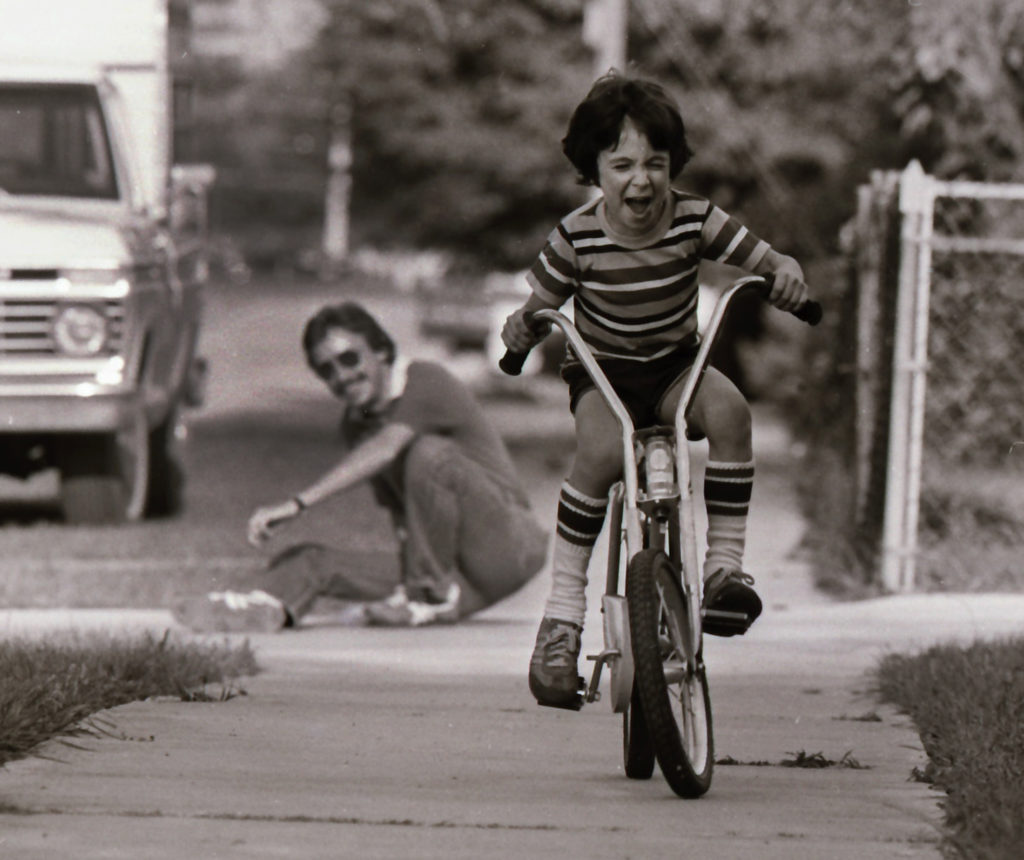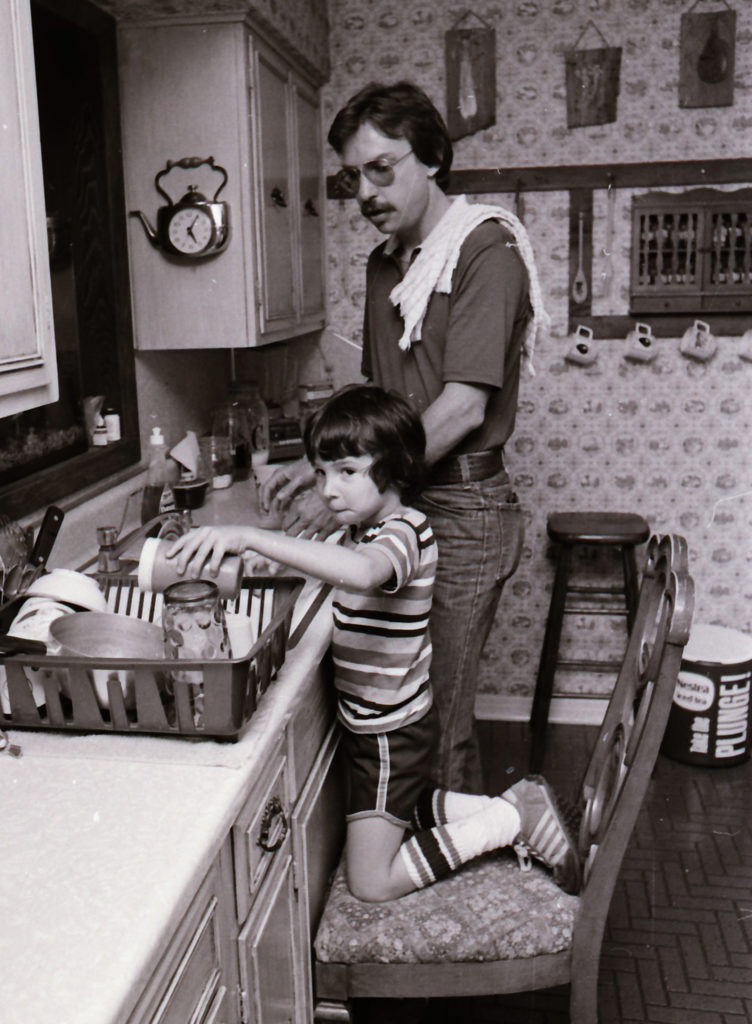
By BESS ADAMS COLEMAN
“With my 5-year-old son, I’m experiencing the greatest love affair I’ve ever had,” said 31-year-old Thom Stork. “There are lots of rocky roads, no question about it, but you can say that I’ve really found my child. I’ll freely admit that for four years he was there and I loved him and we did things together. But I didn’t know him. I wasn’t his best friend.”
“I recently took my 7-year old son out to lunch to talk about my plans to remarry,” said Alan Baker, 38. “I wanted to know how he felt about it. He said, ‘Well, Dad, once in awhile you have a really good idea.’
I said, ‘Well, thank you, and I’d like you to be the best man at the wedding.’ He said, ‘That’s wonderful — what’s a best man?’ ”
“There’s no way to know when something really special will happen between you and your child,” said Dr. Joseph Ferrandino, 38. “Not long ago, I sat in the audience while my 8-year-old daughter auditioned for a part in a play. As she stood on the stage, they unexpectedly asked her to sing a song. My heart stopped, thinking she’d be afraid or embarrassed, but to my surprise she said OK, and began to sing ‘Rudolph the Red Nosed Reindeer in a strong, clear voice. It was a touching moment I‘m glad I was able to have.”
“Through my son, I discovered the child in myself,” said 29-year-old. Joel Hunter. “I remember once getting all excited over a kite I bought for him when he was about 5. We were out running with it against the wind. I was having a ball, but when I looked down he was crying. I asked him what was wrong, and he said, ‘Dad, you won’t let me hold it.’ I was so involved and having such a great time, I almost forgot to let him participate.”’
Four special moments in the lives of four Tampa fathers. These fathers however, represent a new and increasingly prevalent breed of men who, either by choice or circumstance, are raising their children alone.
While the number of such men is growing, the percentage is hardly mind-boggling.
Steve Sessums, a Tampa attorney who limits his practice to marital and family law, found in a recent study in Pinellas County that mothers received custody in approximately 75 percent of all contested cases. Sessums points out that these figures would probably closely reflect those for the state of Florida as well.
“While accurate statistics are hard to come by, my experience tells me that in well over 90 percent of the cases that never reach the court (by far the greatest number), the divorced woman also assumes sole custody,” Sessums said.
In the last few years, several factors have begun to change this traditional pattern. Some divorcing couples decide the husband should take the children because he makes more money.
In other cases, the wife expresses a desire to pursue career interests or to find self-fulfillment outside the role of wife and mother. And some women believe that their husbands may do a better job of parenting.
Whatever the reasons leading more men to raise their children alone, those involved have found themselves thrown back on their own resources in new and challenging ways. They’ve experienced, as any new mother soon learns, the boredom, frustration and occasional pain of caring for young children.
However, with this newly found knowledge of the humdrum comes the joy of knowing unexpected moments of gentle ecstasy with their children that many say makes it worth the effort.
Thom Stork, promotions manager at Tampa’s Busch Gardens, has had custody of his 5 year-old son, Christopher, for almost a year. In many ways, his experiences closely parallel those of Ted Kramer in the recent film. “Kramer vs. Kramer,” which depicts a young father coping with the business of raising his son alone.
“I cried through most of the Kramer film,” said Stork without apology. “To some extent, I identified with Dustin Hoffman as Ted Kramer because I am in the same business. He was in an ad agency, whereas am in a marketing department.
“I was also very work-oriented,” Stork continued. “I probably didn’t spend enough time with my family. Now leave work at 5, because I have to meet the needs of my child.”
After their 8-year marriage ended in divorce, Stork and his former wife agreed that he would have full legal custody. Both parents felt that Stork was in a better economic position to take care of their child.
“I said wanted him, and believe strongly that a son should be with his father,” Stork said.
“The first thing people said to me was, “My God, how are you going to handle this?” Stork said. “Sure there were questions, and it was confusing for me until learned how to budget my time, but from the very first day knew I could do it. I’d been raised knowing how to do basic things, such as cleaning, but didn’t know how to cook.”
Stork’s first attempt at cooking was almost as clumsy as the French-toast scene from the Kramer film. In the movie, Hoffman ineptly stuffed. bread into a coffee cupful of shell-laden batter under the watchful eyes of his son, whose deadpan reply was: “I don’t like it folded, Dad.”
What Kramer was to fench toast, Stork was to spaghetti. “We ate out a lot at first,” said Stork. “But my first meal was scream. I wanted to fix spaghetti, but honestly didn’t know how to cook the noodles. I called one of the women at the office and asked how to do it, and she said, ‘You dummy, you read the side of the box.’ At Christmas she gave me copy of the Joy of Cooking.
Another parallel to the movie occurred one night when Stork was going out. Any evening out for Daddy is always well-planned in advance,” Stork said. “Walking over to my neighborhood babysitter on one of these rare occasions, Christopher went into tirade of ‘Don’t leave me.’ We marched back home and sat down for about 10 minutes of talk and reassurances. When we went back, he pulled the same thing again. I flew off the handle, almost physically dragged him home, threw him into the bathtub, washed him and put him to bed with no dinner at 7:15. Was screaming at him, and he at me. I just shut the door and left.
“About an hour or so later I went into him and we talked. We talked about how Daddy has to have time for himself. I think that one night, even though it hurt us both, was a big step forward.”
One major difference in Stork’s experiences and the Kramer film was an absence of conflict between his job and the needs of his child. While Kramer ultimately lost his job because of this conflict, Stork credits his company with being very supportive of his decision to raise his son.‘ “My relationship with this company from the top man down to my immediate supervisor is that ‘If that little guy has doctor’s appointment or needs you, you go,’ Stork said.
While Stork received sole custody of his child, some men have joint or shared custody of children following divorce. This arrangement enables couple to develop pattern for dividing the time child spends with each parent. Usually, one parent will be the primary parent, or the one responsible for greater portion of the child’s care.
